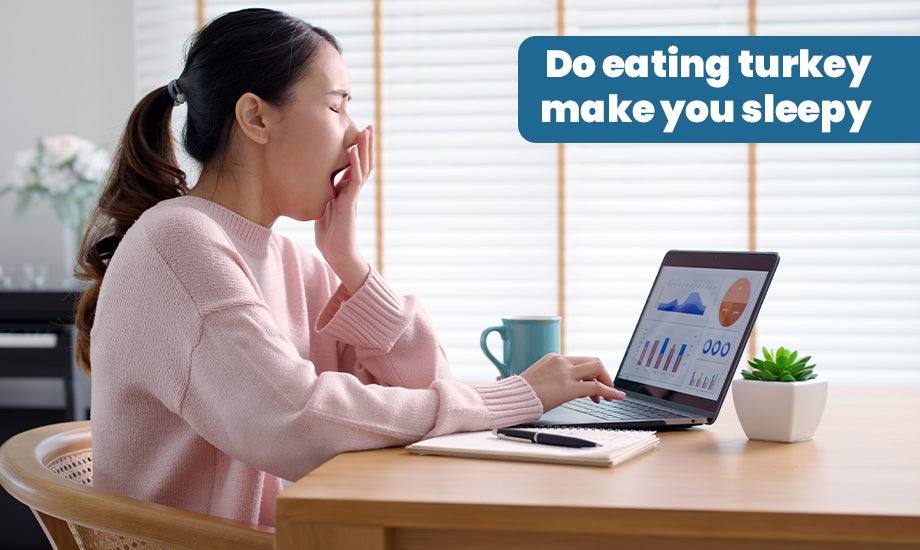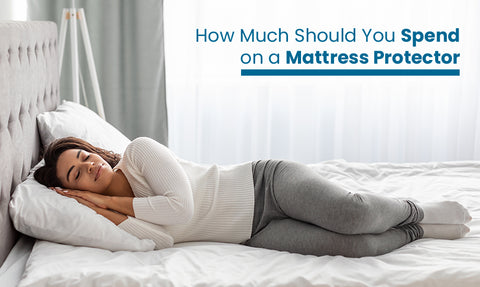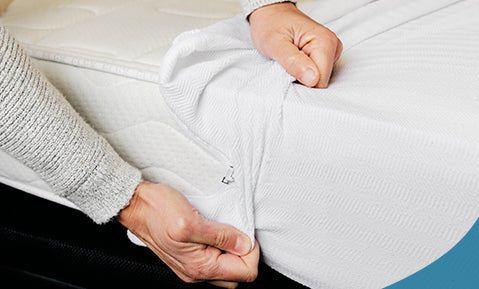
Ever felt sleepy or yawning after having a high exercise dinner?
Most of us love the high protein non veg treat and couldn't resist having a full of it.
But why do we feel drowsy after filling our tummy with all that cravings? Especially a turkey meal.
The reason behind it is that it contains the amino acid tryptophan, which is a precursor to serotonin and melatonin. When tryptophan enters the brain, it triggers the production of serotonin, which helps to regulate our mood, and melatonin, which helps to regulate our sleep/wake cycles. Eating a large amount of turkey can cause an increase in serotonin and melatonin, which can make us sleepy.
Infusion of Tryptophan

Tryptophan is found in many foods, but turkey contains the highest levels of it. This amino acid helps your body produce serotonin, a neurotransmitter that helps regulate your sleep-wake cycle and plays a role in mood regulation. When the serotonin levels in your brain increase, it can make you feel sleepy.
It’s not just the tryptophan in turkey that can make you sleepy. Turkey also contains a significant amount of fat, which can slow down digestion and make you feel sluggish. Additionally, turkey is a large, high-protein food that can take a lot of energy to digest. All of these factors can leave you feeling tired after enjoying a big plate of turkey.
Eating turkey also can cause you to become sleepy because of the social setting in which it’s typically served. Holidays, family gatherings, and other special occasions often involve large meals, which can be filled with socializing, laughing, and other activities.
Rise of Turkey Consumption
Turkey consumption has been on the rise in the United States for a number of years. The National Turkey Federation (NTF) reports that Americans ate over 16 pounds of turkey per person in 2019. This number is up from the 15.7 pounds per person in 2018.
Turkey is seen as a healthy alternative to other meats. It is high in protein, low in fat and saturated fat, and is a source of essential nutrients such as iron and zinc. Additionally, it is an excellent source of the essential amino acid tryptophan, which is important for muscle growth and repair.
The NTF also reports that Americans are increasingly using turkey in new ways. Ground turkey is becoming increasingly popular in burgers, tacos, and stir-fries. Additionally, turkey is becoming increasingly popular in sandwiches, salads, and soup.
The NTF estimates that more than 88 percent of Americans eat turkey at least once per month. This number is up from 81 percent in 2016.
Turkey consumption is also increasing in other countries. The NTF reports that in 2019, the United Kingdom consumed an estimated 4.4 million pounds of turkey, up from 3.6 million pounds in 2016.
How to prevent sleepiness after a meal

If you don't want to be yawning after taking your favorite meal, follow some of this instructions:
- Avoid eating large meals before bed. Eating a large meal can make it harder to fall asleep, so try to avoid eating a big meal right before bedtime.
- Avoid eating foods that are high in tryptophan. Tryptophan is an amino acid found in turkey that can make you feel sleepy. Try to limit your intake of foods that contain tryptophan, such as turkey, cheese, nuts, and seeds.
- Get regular exercise. Exercise can help your body to relax and can also help to regulate your sleep cycle. Aim to get at least 30 minutes of exercise each day.
- Avoid drinking alcohol and caffeine. Alcohol and caffeine both can interfere with your ability to get a good night’s sleep. Try to avoid drinking these beverages, especially close to bedtime.
- Stick to a regular sleep schedule. Going to bed and waking up at the same time each day can help your body to adjust to a consistent sleep pattern.
12 Foods with tryptophan
While excess tryptophan results in sleepiness, tryptophan is essential to induce cognitive function of sleep. Some foods have more tryptophan than others and can be used to overcome sleep deprivation. Few of them are listed as:
- Chickpeas: Chickpeas are a great source of tryptophan, a precursor to the neurotransmitter serotonin. One cup of cooked chickpeas contains 0.25 grams of tryptophan.
- Soybeans: Soybeans are an excellent source of tryptophan. One cup of cooked soybeans contains 0.71 grams of tryptophan.
- Cheese: Cheese is a great source of tryptophan. One ounce of cheddar cheese contains 0.19 grams of tryptophan.
- Tuna: Tuna is a great source of tryptophan. One can of tuna contains 0.42 grams of tryptophan.
- Salmon: Salmon is an excellent source of tryptophan. One four-ounce serving of salmon contains 0.55 grams of tryptophan.
- Milk: Milk contains a high amount of tryptophan, which can help improve the quality of your sleep.
- Shrimp: Shrimp is another great source of tryptophan. One four-ounce serving of cooked shrimp contains 0.34 grams of tryptophan.
- Nuts and Seeds: Nuts and seeds are natural sources of tryptophan and can help to reduce stress and anxiety.
- Eggs: Eggs are a good source of tryptophan, which can help to reduce stress and improve your mood.
- Tofu: Tofu is a great source of tryptophan, which can help to improve sleep quality and mood.
- Tempeh: Tempeh is a fermented soy product that is a good source of tryptophan, which can help to reduce anxiety.
- Bananas: Bananas are a great source of tryptophan, which can induce sleep and relieve anxiety.
The Science behind Tryptophan

Tryptophan is an essential amino acid that is a building block of proteins in the body. It is one of the nine essential amino acids that the body cannot produce on its own and must obtain from dietary sources. Tryptophan is found in a variety of foods, including eggs, dairy products, nuts, seeds, meat, and legumes.
In the body, tryptophan is used to produce serotonin, a neurotransmitter that is involved in regulating mood, sleep, appetite, and memory. It is also a precursor for Vitamin B3 (niacin) and melatonin, a hormone that regulates the sleep-wake cycle. Tryptophan also serves as an antioxidant, helping to protect cells from damage.
In addition to its role in the body, tryptophan has been used in traditional medicine to help treat a range of conditions, including depression, anxiety, insomnia, and premenstrual syndrome (PMS). It may also help to reduce the symptoms of some inflammatory diseases.
5 reasons why Tryptophan is important

Tryptophan is essential when it comes to sleep. Lack of tryptophan can have an ill effect on your sleep cycle and in regulation of brain and body mechanisms. Deprivation of tryptophan can result in:
- Impaired Cognitive Function: A lack of tryptophan in the body can lead to impaired cognitive function and reduced alertness.
- Increased Stress Levels: Low levels of tryptophan can lead to increased stress and anxiety.
- Poor Sleep Quality: Low levels of tryptophan can lead to insomnia and poor sleep quality.
- Low Energy Levels: Lack of tryptophan can cause feelings of fatigue and low energy levels.
- Poor Appetite: Low levels of tryptophan can lead to a decreased appetite and weight loss.
Sleep is a requirement which can not be excused. A consistent tryptophan balance is needed for your ideal sleep. Moreover what you can do is to get yourself a comfortable sleep pillow to complete the baseline of a healthy sleep.
You don't think of booking your next table at a high end restaurant, so why not give a sleepy pillow instead.












